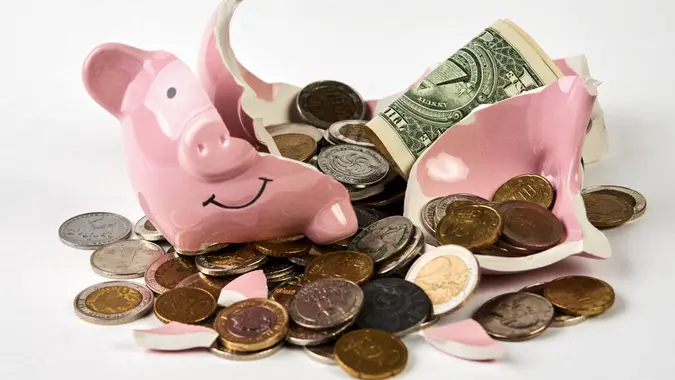What Is a Slush Fund?

Commitment to Our Readers
GOBankingRates' editorial team is committed to bringing you unbiased reviews and information. We use data-driven methodologies to evaluate financial products and services - our reviews and ratings are not influenced by advertisers. You can read more about our editorial guidelines and our products and services review methodology.

20 Years
Helping You Live Richer

Reviewed
by Experts

Trusted by
Millions of Readers
The term “slush fund” refers to money that has been set aside without a designated use. A business might keep a general account that is a slush fund. However, many people use a slush fund when managing their personal finances without realizing it.
Here’s a look at the history of the term and how a slush fund can benefit one’s finances.
What Is a Slush Fund?
A slush fund is a stash of money with no specifically defined purpose. It is commonly used by businesses as a petty cash fund, used to cover small and/or unexpected expenses that are not provided for by any other line-item. While ostensibly a designated fund for miscellaneous expenses, the term “slush fund” has developed something of an unsavory reputation thanks to the actions of a few bad corporate actors.
However, a slush fund doesn’t necessarily have to be used for nefarious purposes — and in the great majority of examples, it’s a completely legitimate pool of cash.
The Origins of Slush Funds
The term “slush fund” has a unique history that began during the 18th century in the shipping industry. Some 300 years ago, a slush fund referred to extra funds sailors made from selling bacon fat, or what they called slush. They were then allowed to use this money “to obtain small luxuries or pleasures,” according to Merriam-Webster.
Legitimate Uses of Slush Funds
A slush fund often refers to an “emergency fund” in relation to personal finances, or simply funds that fall outside of the daily budget. Technically, an emergency fund’s designated use is to pay for unexpected expenses. But until an unexpected expense arises, one could argue the money is undesignated.
The biggest benefit of having a slush fund is being able to avoid debt. A slush fund can mean the difference between pulling out a credit card to cover an unexpected expense and having the cash to pay for it.
The slush-fund concept can be a helpful tool for building savings. Intentionally stashing money away for any reason is an excellent habit to develop.
Having a slush fund can minimize financial stress. It can help reduce some of the worries if a loss of income or other financial emergency occurs.
Everyone should have at least one slush fund. Ideally, savers could have a few slush funds waiting for a specific designation, such as:
- An emergency fund
- A sinking fund
- A holiday fund
- A vacation fund
- An education fund
The vacation might not be planned yet, and future emergencies are unknown — but the money will be there when needed if stashed away regularly.
The Dark Side: Illegitimate Slush Funds
In addition to Merriam-Webster’s nautical definition of a slush fund, the dictionary also has two additional interpretations: a fund for bribing public officials or carrying on corruptive propaganda and an unregulated fund often used for illicit purposes.
These types of illegitimate slush funds come from the secretive skimming of corporate profits or political donations. Usually, these types of slush funds are kept hidden as they are used for purposes other than their original intention.
Slush Funds in Politics
In modern times, politics and slush funds have gone hand in hand. Sometimes it comes in the form of padding added to various legislation, while other times it’s funds raised for campaigns or parties and not fully accounted for. Regardless of the circumstances, it’s not uncommon for funds in the political arena to be diverted to various unsavory purposes, from influencing elections and votes to providing favors in exchange for loyalty.
Of course, this isn’t a modern political invention either. In the heyday of kings and queens, royalty would commonly keep secret funds on hand for covert purposes designed to shore up their own support. This could take the form of everything from bribes to funding a secret spy network, as Queen Elizabeth I did via her principal secretary Sir Francis Walsingham.
How Slush Funds Are Hidden
Slush funds can be hidden in many ways. Some unscrupulous operators — whether individuals, corporations, or even governments — create offshore accounts that are either hidden from authorities or disguised as legitimate ones.
Some even go so far as to create shell companies, which are essentially “paper” companies used to hide assets or even illegal operations of another company. Others simply falsify records or neglect to report all taxable income, with the gap between actual and recorded amounts funneled to a secret slush fund.
Notable Examples of Slush Fund Scandals
One of the most famous slush fund scandals in recent years led to the downfall of a president. In 1972, Republican operatives used a political slush fund to finance the break-in at the headquarters of the Democratic National Committee, leading to the resignation of Republican president Richard Nixon the following year.
But slush fund scandals aren’t restricted to the political world. One of the most famous slush fund scandals in modern history occurred in 2001, when energy industry giant Enron collapsed. Various high-ranking executives in that firm engaged in an elaborate web of offshore accounts and phony transactions — along with slush fund financing — to inflate profits and hide debt.
The Future of Financial Transparency
Financial regulators have always tried to be one step ahead when it comes to protecting the public from financial crimes. This applies to the inappropriate skimming or outright stealing of funds from private, corporate or government sources for nefarious purposes.
The Financial Data Transparency Act of 2022, for example, required financial regulatory agencies “to adopt specified data standards with respect to format, searchability, and transparency.” It also decreased the cap on the surplus funds available at Federal Reserve banks. However, there will always be a struggle to keep hidden slush funds out of politics and to prevent unscrupulous actors from siphoning off public, governmental and private funds.
Conclusion
While people are no longer selling bacon fat to build slush funds, they are still building them and realizing the benefits. A slush fund might not be a commonly used personal finance term, but the concept is undoubtedly a useful tool.
Hanging on to extra funds for future use makes good financial sense. Just make sure to put the money to work in an interest-bearing account if it isn’t going to be used right away.
John Csiszar contributed to the reporting of this article.
Our in-house research team and on-site financial experts work together to create content that’s accurate, impartial, and up to date. We fact-check every single statistic, quote and fact using trusted primary resources to make sure the information we provide is correct. You can learn more about GOBankingRates’ processes and standards in our editorial policy.
- Merriam-Webster. "The Appetizing Origins of 'Slush Fund'."
- U.S. Consumer Financial Protection Bureau. "An essential guide to building an emergency fund."
- United States Securities and Exchange Commission "Civil Action No. H-03-4883"
- 117th Congress (2021-2022) "Financial Data Transparency Act of 2022"
- CNBC "How the rich and powerful use secret offshore companies to hide vast amounts of wealth, leaked documents show"
- Encyclopedia of Britannica "Sir Francis Walsingham"
 Written by
Written by  Edited by
Edited by 

























